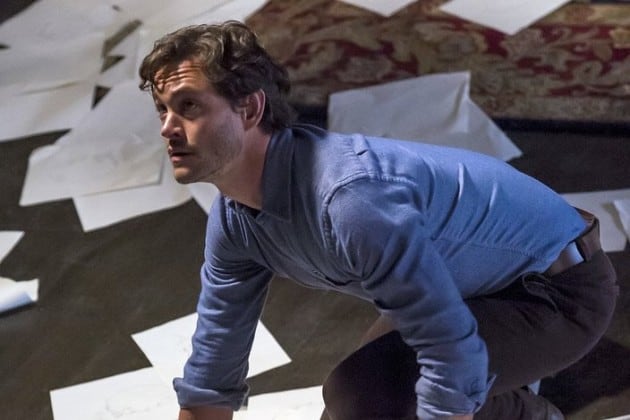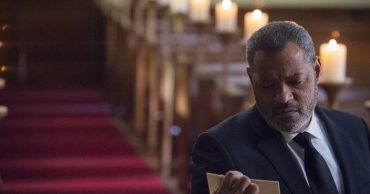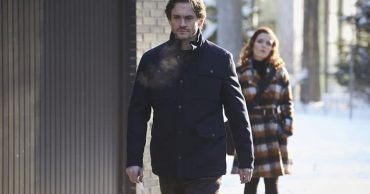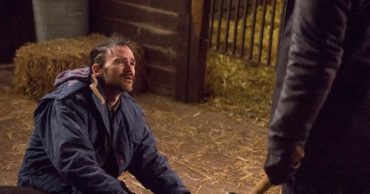
When The Beach Boys came out with Pet Sounds in May of 1966, it was largely in response to the genius of The Beatles’ Rubber Soul–that bird’s first major step into its more progressive, less commercial phase that would define the rest of its career. The Beatles’ next album, Revolver, then became a response to Pet Sounds. These albums, though, were not directly tied to one another in the sense that they were companion pieces; instead, and in retrospect, they show a microcosm of how creatively flourishes within a community of artists. Television functions in a similar way. One transcendent series paves the way for another, which wears its inspiration on its sleeve while finding new and interesting ways to tell stories. The best series do, anyway. Hannibal, being among those series, is a response to many things, not just other television (but if you want to watch one of its progenitors, Twin Peaks, it certainly enhances the Hannibal experience). Hannibal is a response to classical visual art, classical and ambient music, Thomas Harris, gourmet cooking and the power of the intellect, among other things. Its conversations with those influences filters down into its episodes, often in the form of characters representing more general worldviews or ideas. In “Primavera,” Will Graham considers aloud–and to himself, really–the influence Hannibal Lecter has had on his life. Will says that “God only knows where I would be without him.” Compare that with “God Only Knows” from Pet Sounds, a love song that could easily describe the Will-Hannibal relationship: “God only knows what I’d be without you.” Will Graham and Hannibal Lecter play off each other in Hannibal in ways not dissimilar to the Rubber Soul, Pet Sounds and Revolver trio. One impresses the other and causes him to react with even more vigor and ingenuity. And, when it comes right down to the lyrics (or dialog), it’s impossible for Will to deny the extent to which Hannibal has shaped who he is. Though their friendship is irreparably damaged at this point, they needed each other. Now, they need to figure out how to live in a world without each other.
It’s a terrifying prospect for both characters, because it means giving up huge parts of themselves–parts that they built together. Abigail is the most prominent of those shared parts, and though we may never get more than the “I’m sorry I couldn’t protect you in this life” from Hannibal in season one’s “Releves” to represent his feelings for her, Will’s interactions with Abigail in “Primavera” are heartbreaking enough as a goodbye for both of them. “Primavera” is much sadder the second time around by virtue of the necessary consideration of Will having to project Abigail in his waking life, because he feels so much guilt and obligation. When he finally has to let go and witness her throat opening once more, it’s with that special kind of melancholy that pervades the best and most memorable love songs of each generation. “A place was made for you, Abigail,” he says. “In this world. It was the only place I could make for you.” Bryan Fuller has framed Hannibal in the media as a relationship of sorts: season one being the “bromance,” season two being the break-up and season three being the after or the rebuilding and recovery. In can seem like a diminutive way of looking at the structure of such a meticulously plotted narrative, but it’s actually rather apt. Abigail, then, is one of those mementos kept in a drawer that has to be discarded so that Will might have some semblance of a shot at moving on.
Romantic relationship comparisons also help us understand the “I forgive you” line that loudly echoes in our ears long after “Primavera” has finished. Will and Hannibal’s relationship mirrors what a conventional romantic relationship might in the sense that feelings are felt and expressed on the extremes. There is deep love shared between the two, and when that love is damaged, reactions are violent and hateful. The cliché is that we hurt the ones we love the most. The more accurate phrasing is that we are able to hurt the ones we love the most, because we know them so well. It’s because of that closeness that we know exactly which buttons to press that are felt hardest. Slitting Abigail’s throat is that to the extreme, to be sure, but Hannibal is extreme by nature. Just as extreme is Anthony’s body folded up into a “broken heart”–to Will, from Hannibal (less a “for my valentine,” more a “this is what you’ve done to me, and I’m still grieving because of you”). The forgiveness comes long after the hurt, or at least eight months after. In the same way that we can look back on our past relationships with the benefit of emotional distance, Will recognizes who he and Hannibal were back then. He can never forget Abigail–never escape the conjoining of his life with hers–but he can understand why Hannibal did what he did. And once the love they shared transformed into something else, forgiveness is possible. It doesn’t mean reconciliation can lead to reunion. Hannibal knows that, as he can only ingest the sharp pain of hearing his former love say those words. He, too, has to move on.
So, the million dollar question again: what does life look like now? How does Will live on? The answer seems to be in his return to what he does best. Superficially, that’s profiling. More generally, that’s helping people. Even in his state of disarray, Will is able to help Inspector Rinaldo Pazzi (Fortunato Cerlino), another character trying to figure out his role in life after failing to catch Il mostro. Will has been on the other side and seen what it’s like, so his warning to Pazzi to leave it be if he values his own life is a genuine one. Pazzi, however, is much more important in “Primavera” than just as a way of showing Will’s effectiveness at his job. Pazzi is also a way of showing the best of Will Graham. “Those moments when the connection is made–that is my keenest pleasure,” Pazzi tells Will. “Knowing. Not feeling, not thinking.” This describes Will at his optimal level. Feeling and thinking are part of the process, but the knowing should be the end result. Will’s empathy disorder is mitigated when his empathy leads him to answers. Only then does he find rest, and I think it’s only in those short bursts of relief-following-trauma that Will might be able to piece himself back together. Pazzi may not be the bedrock that is Jack Crawford, but just his presence allows Will to see himself from someone else’s perspective and to know that he’s not “already dead”; he still has a lot of living to do.
To risk belaboring the point, I want to bring this back around to Pet Sounds, because understanding what Will is going through right now is worth exploring from slightly unconventional perspectives (although, there’s absolutely nothing unconventional about the importance of music in Hannibal). In the progression of Pet Sounds, three songs stand out that help re-contextualize Will and Hannibal’s relationship. “Wouldn’t It Be Nice” highlights the promise of something great that the characters would have felt deep in their bones during the first season of Hannibal: “Wouldn’t it be nice to live together in the kind of world where we belong” (my emphasis). Will and Hannibal are people who belong in very few places by social standards. They are outcasts and misfits, and it was blind luck that brought them together. When two people who are like that have the opportunity to share each other’s burdens, it’s no wonder to what extents Hannibal was willing to go to make sure Will didn’t leave him. “God Only Knows” frames the relationship in its troubled times: “If you should ever leave me, though life would still go on believe me, the world could show nothing to me, so what good would living do me?” The lyrics evoke that image of Hannibal sitting in his office chair staring at the empty chair across from him where Will used to sit. It also evokes part of Will’s situation now in the “though life would still go on” line, as that aspect of the break-up is still being wrestled with. Finally, “I Just Wasn’t Made for These Times” provides a more concrete look at the crossroads Will finds himself in front of: “I’ve been trying hard to find the people that I won’t leave behind” and “Can’t find nothin’ I can put my heart and soul into.” This is what happens after the heartbreak–Will looks back on the things he’s experienced and worries that the future is going to look similar and that every new person is going to end up being another one he’s going to have to leave behind, just like Abigail. But he can find something he can put his heart and soul into. “Primavera” is sympathetic enough to offer him that, and it’s the thing we have to root for with every fiber of our beings. Even though Hannibal has so much more story to tell and the chance that the Will-Hannibal relationship remains at the heart of that is somewhere between 100 and 100%, “Primavera” ultimately functions as a transition sentence is Hannibal‘s story. Things will really and truly never be the same, and just as Will has to say goodbye to Abigail, we have to say goodbye to Hannibal as we knew it.
Bite-Sized Thoughts–Buon appetito!
– I swear I don’t work for The Beach Boys’ promotion company.
– That opening flashback to “Mizumono” is completely different aurally. Here, the sound design is more tense and confrontational. And I personally find the scene itself more horrific because of that. It doesn’t have the same beautiful artistry of “Mizumono” and, instead, plays out like the cold-blooded murder that it is.
– More Under the Skin-ness: Will sinking in the water. Everyone go watch Under the Skin.
– “If everything that can happen happens, you can never really do the wrong thing. You’re just doing what you’re supposed to.” That’s one way of trying to cope with the events of “Mizumono” (and, I guess, Hannibal overall). But it certainly doesn’t make me feel any better.
– Hey, it’s Hannibal’s office! More flashbacks there, please. It’s too elaborately gorgeous of a set to get rid of. Just have Will open up shop there whenever he returns to Baltimore.
– “Elegance is more important than suffering.” This is one of those brilliant Hannibal lines that may or may not reach just a little bit higher than it needs to. Still, I love the idea of helping people as “inelegant” and how that might say something about how Hannibal views what Will does for a living.
– More flashbacks to Hannibal, il mostro, please. It’s not only entertaining seeing a younger Hannibal (and enlightening to find out what the character and his motivations were like before the events of Hannibal; I’m going to pretend Hannibal Rising doesn’t exist, like any sane person would), but it’s also stylistically wonderful with the noir tinge accompanying Pazzi’s voice-over narration.
– I don’t even know what to say about that hart heart. Easily one of the most memorable images in a series designed to produce memorable images. I’m glad the stag is back? Consistency is nice in that comforting way. But seriously, the unfolding of the body is absolutely gruesome. Director Vincenzo Natali did do Splice, though, so the design of the corpse creature was certainly given over to the right person.
– “Hannibal follows several trains of thought at once without distraction from any, and one of the trains is always for his own amusement.” Hannibal also rides trains, like he did last week. I realize this isn’t a useful observation in any way. I just like plays on words.
– One of the best sequences in any episode of Hannibal has to be the cutting back and forth between Will’s body being worked on while Abigail’s corpse is being prepared. Devastating in all the right ways. And even though Kacey Rohl is bound to show up again in phantom form at some point in this series, I’ll take this time–now that we know Abigail is officially dead–to praise the actress for such an outstanding performance in a series dominated by big performances (Eddie Izzard, Raul Esparza, Gina Torres and Michael Pitt among the biggest of the supporting characters). I’ve always loved Abigail’s character and how she bounces off the central characters in the series. Ciao.
Hannibal by the Numbers:
Speaking Roles in “Primavera”
1. Will, 97 lines
2. Pazzi, 68 lines
3. Abigail, 30 lines
4. Hannibal, 30 lines
5. Inspector, 3 lines
6. Officer 1, 3 lines
7. Officer 2, 2 lines
8. Doctor, 2 lines
Total: 8 speaking roles, 235 lines
21 total scenes
Longest scene by line count: opening flashback to “Mizumono,” 34 lines
Shortest scene by line count: 8-way tie, 0 lines
Extraneous observation: no scene in “Primavera” takes place outside (other than establishing shots)
[Photo via NBC]
 Follow Us
Follow Us






Loved it.